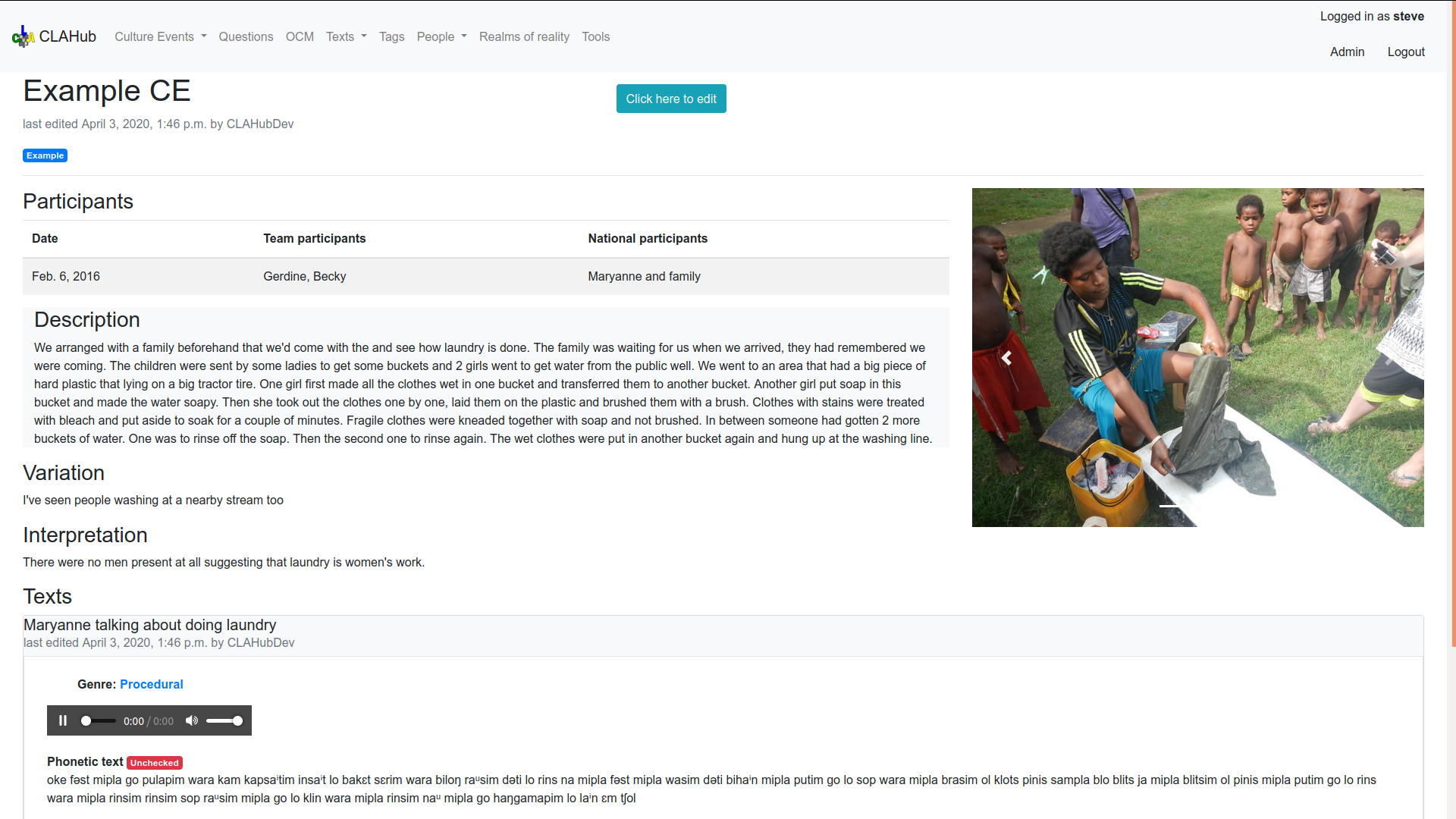A webapp project to give bush teams a way to collaboratively create and maintain a culture file for learning tribal language and culture. The software is intended to be run on a Raspberry pi 3 on an internal team network and accessed through a desktop web browser.
Check out http://stevetasticsteve.pythonanywhere.com to see a showcase version. Login with admin, password: clahub
CLAHub is available as a docker container. An installation script is provided if you want a one command install.
curl https://raw.githubusercontent.com/stevetasticsteve/CLA_Hub/master/deployment_tools/install_CLAHub.sh | bash
warning Running the above script is bad practice - it downloads code from the internet and runs it on your system. Only use it if you trust me :) Or check the script to make sure there's no funny business behind the scenes.
- Installs Docker using docker convenience script
- Downloads CLAHub Docker image (180Mb for x86, 813Mb for arm)
- Runs CLAHub as a container listening on port 8000 (will survive system restarts)
- Database persists in a Docker volume named clahub
Go to server_ip_address:8000 to access CLAHub. Login as admin with password clahub, then add your users in the admin and get to work.
Use Docker desktop
-
Download the CLAHub code by cloning the repository with Git (roughly a 10Mb download):
Open a Powershell window (Windows), or terminal (Linux) and type:
git clone https://github.com/stevetasticsteve/CLA_Hub /path/to/new_folder
Replace /path/to/new_folder with where you want the new folder to be!
-
Create a python virtual environment in the new folder
Windows Linux Open a Powershell window in the folder, type: Open a terminal in the folder, type: python -m venv venv python3 -m venv venv -
Activate the virtual environment
Windows Linux In the Powershell window type: In the terminal i, type: venv\Scripts\activate.bat source venv/bin/activate -
Change from production to development settings
- go to CLAHub/settings folder
- open ___init__.py in a text editor (like notepad)
- change from .production import * to from .development import *
- save ___init__.py
-
Install the Python dependencies (roughly a 12Mb download)
In Powershell/terminal type: pip install -r requirements.txt
-
Create (or copy over) the database f
- In Powershell/terminal type: python manage.py migrate
- Create at least one new user, type: python manage.py createsuperuser
- Follow the prompts to create a user. Repeat as necessary.
If a team has already been working with CLAHub a database can be imported. This can be used so individuals have a (non synced) copy of contents of CLAHub to view when not connected to the team's network - or if the server is migrating to a new machine.
- Copy the old CLAHub_database.db into the new folder (the same place as manage.py). This copies over all users, passwords and data that has been entered.
- Replace the uploads folder in the new installation (which is mostly empty) with your old uploads folder. This copies over all uploaded audio and pictures.
-
Launch the server
In Powershell/terminal type: python manage.py runserver You need to leave this terminal open, if you close it the server will close
An error will be displayed if the virtual environment isn't enabled. If your terminal doesn't say (venv) then do stage 3 again to activate the venv. This needs to be done every time you launch.
-
Use CLAHub
Open a web browser and navigate to localhost:8000
CLAHub is running on your computer until you close the terminal, or shut down the computer. It is available only from your computer, other computers are unable to access CLAHub in this run mode. If you want other computers to access CLAHub you need to deploy it properly, see Deployment below
There is a quick and dirty way to enable access on the LAN for other machines. Use the command python manage.py runserver 0.0.0.0:8000 for stage 7. This isn't the best way to do it, but it will work for a small team if you don't mind leaving your computer on and/or manually starting CLAHub often.
python manage.py test CE people
Django - the web framework used
Contributions are very welcome. See Contributing for details.
This project is licensed under GPL 3.0 .
